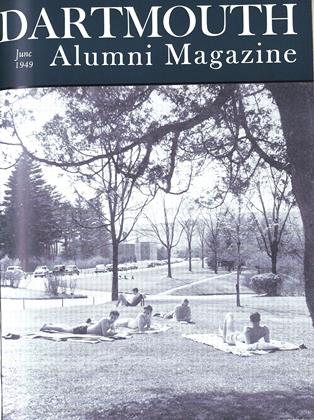by Willard. Connely 'II. Cassell Co., Ltd.;1949; 349 pages; 21 shillings.
This book is a scholarly, sympathetic, very readable biography of the man whom its author regards as the merriest and most humane of the Restoration dramatists. Farquhar's principal achievements could invite merely paradoxical explanations. He wrote his liveliest comedy, The Beau Stratagem, on his death bed, in 1706, and so made the twilight of Restoration drama sunnier than its noon. But Mr. Connely proves that the contradictions or inconsistencies in the playwright's character and career were not very mysterious. In his youth, his conduct and language typified the absurd pseudo-classical cynicism of Restoration gallants (one of whom called a girl a "Scoundrel Nymph"); but, as he matured, his amatory disposition altered, and his libertinage became something more like love. Entrapped into marriage by a tedious widow, he studied Milton's tractates on divorce; and the most amusing result of Farquhar's personal experience with wedlock was the scene in his last play when Mr. and Mrs. Sullen divorce each other, on the stage, with dialogue as gay as a gypsy wedding. This was a dramatic novelty, but the real life of Captain George Farquhar appears to have been full of tragi-comic episodes. He greatly resembled his fictitious hero Mr. Archer, who
"fights, loves, and banters all in a breath." Although such a personage may not deserve our moral approbation, his idiosyncrasies are vastly diverting; and his biographer renders full justice to a very fascinating subject.
 View Full Issue
View Full Issue
More From This Issue
-
 Article
ArticleMusic at Dartmouth
June 1949 By ANDREW L. PINCUS '51 -
 Class Notes
Class Notes1918
June 1949 By ERNEST H. EARLEY, DONALD L. BARR, RICHARD A. HOLTON -
 Article
ArticleSalmon P. Chase
June 1949 By EDWARD C. LATHEM '51 -
 Class Notes
Class Notes1897
June 1949 By WILLIAM H. HAM, MORTON C. TUTTLE -
 Class Notes
Class Notes1937
June 1949 By ROBERT C. BANKART, ARTHUR H. RUGGLES JR., ALAN W. BRYANT -
 Class Notes
Class Notes1926
June 1949 By E. PAUL VENNEMAN, HERBERT F. DARLING, ALBERT E. M. LOUER
H. M. Dargan
-
 Books
BooksTHE HOUSE OF THE DAMNED
January 1935 By H. M. Dargan -
 Books
BooksDR SCARLETT:
November 1936 By H. M. Dargan -
 Books
BooksTHERE WAS A CROOKED MAN
January 1937 By H. M. Dargan -
 Books
BooksTHE STRANGE WOMAN
November 1941 By H. M. Dargan -
 Books
BooksWHERE THERE'S SMOKE,
April 1947 By H. M. Dargan -
 Books
BooksTHE SOURCES OF "MUCH ADO ABOUT NOTHING,"
February 1951 By H. M. Dargan
Books
-
 Books
BooksFACULTY PUBLICATIONS
April 1940 -
 Books
BooksTHE MOUNTAIN MEN.
MARCH 1964 By ALLEN R. FOLEY '20 -
 Books
BooksTIDEWATER TOWNS: CITY PLANNING IN COLONIAL VIRGINIA AND MARYLAND.
MAY 1973 By ARDEN BUCHOLZ '58 -
 Books
BooksRecord Completed
March 1980 By Charles M. Wiltse -
 Books
BooksTHE POETRY OF ROBERT FROST.
MARCH 1970 By STEARNS MORSE, A.M. '36 -
 Books
BooksINTERNATIONAL ARBITRAL PROCEDURE
November, 1930 By W. A. Robinson

